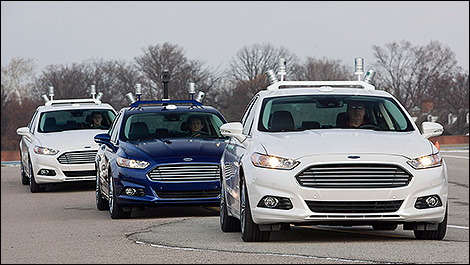Jul
21st
Stay connected Subscribe to our RSS feed
Scientists working for Toyota believe that the future assault of fully autonomous cars may end up increasing overall fuel consumption and air pollution, despite the fact that these vehicles feature a bunch of technologies designed to eliminate traffic accidents and congestion, and in turn reduce fuel use.
Okay, how is that possible, you say? Well, they argue that by making daily commutes faster and more enjoyable, allowing drivers to complete various tasks instead of actually driving, autonomous cars will simultaneously add to urban sprawl and encourage people to hit the road more often.
“U.S. history shows that anytime you make driving easier, there seems to be this inexhaustible desire to live further from things,” Ken Laberteaux, senior principal scientist at Toyota Research Institute-North America, said in an interview at the Automated Vehicles Symposium in San Francisco. “The pattern we've seen for a century is people turn more speed into more travel, rather than maybe saying ‘I'm going to use my reduced travel time by spending more time with my family.'”
While Toyota is preaching more of a “co-pilot” approach, U.S. safety regulators want to accelerate the development of so-called driverless cars in order to reduce traffic accidents that annually kill more than 30,000 people.
Do you think drivers will spend more time on the road with autonomous cars than they do right now with regular cars?
Source : bloomberg.com
Okay, how is that possible, you say? Well, they argue that by making daily commutes faster and more enjoyable, allowing drivers to complete various tasks instead of actually driving, autonomous cars will simultaneously add to urban sprawl and encourage people to hit the road more often.
 |
| Photo: Ford |
“U.S. history shows that anytime you make driving easier, there seems to be this inexhaustible desire to live further from things,” Ken Laberteaux, senior principal scientist at Toyota Research Institute-North America, said in an interview at the Automated Vehicles Symposium in San Francisco. “The pattern we've seen for a century is people turn more speed into more travel, rather than maybe saying ‘I'm going to use my reduced travel time by spending more time with my family.'”
While Toyota is preaching more of a “co-pilot” approach, U.S. safety regulators want to accelerate the development of so-called driverless cars in order to reduce traffic accidents that annually kill more than 30,000 people.
Do you think drivers will spend more time on the road with autonomous cars than they do right now with regular cars?
Source : bloomberg.com
 The latest auto news, reviews, prices, product and vehicle releases.
The latest auto news, reviews, prices, product and vehicle releases.